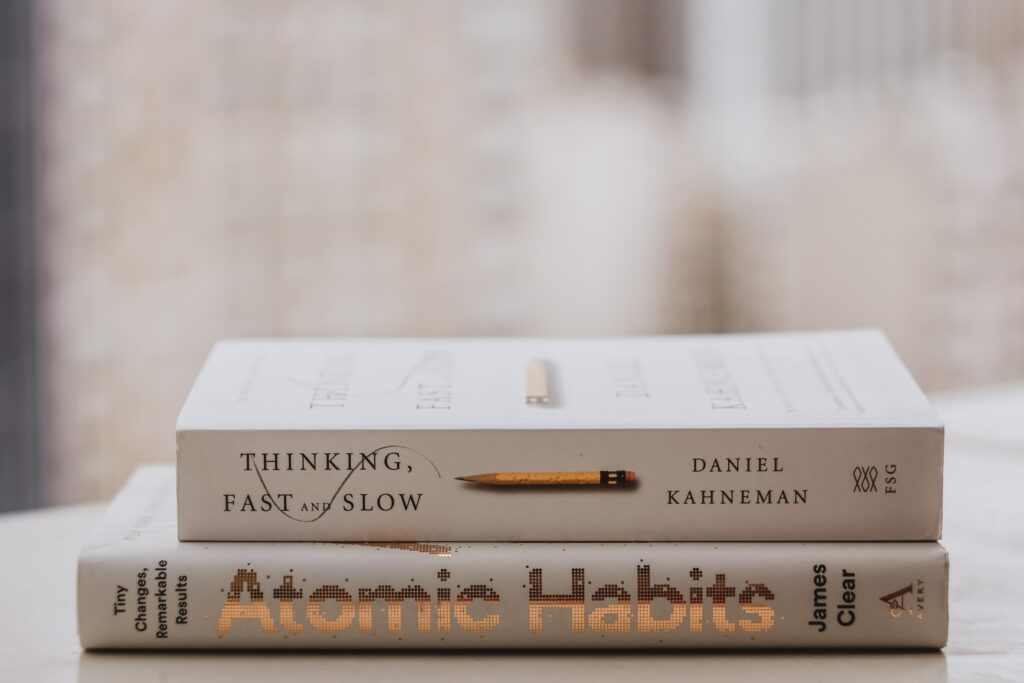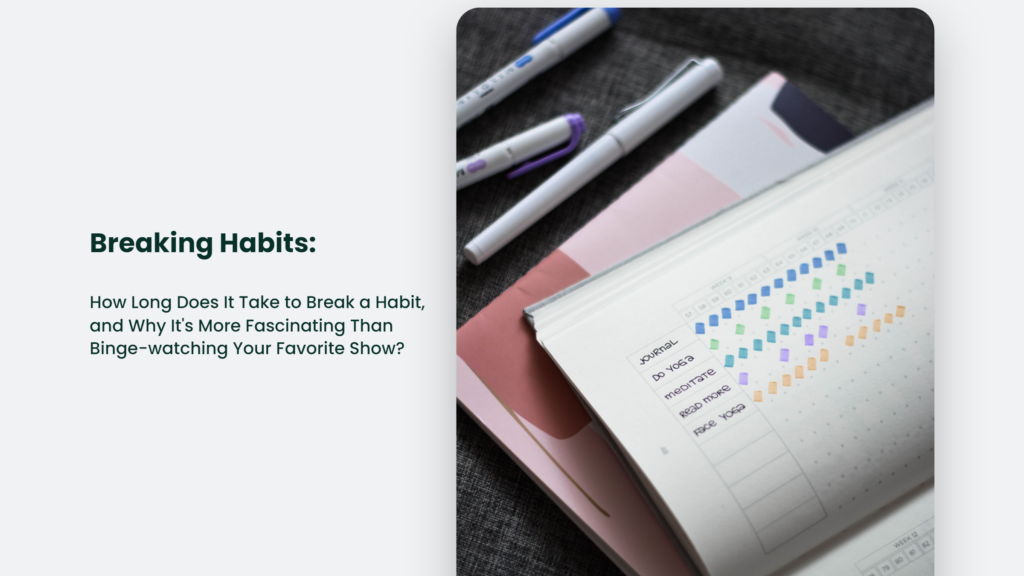

Breaking Habits: How Long Does It Take to Break a Habit, and Why It’s More Fascinating Than Binge-watching Your Favorite Show?

As Seen On
We’ve all heard the saying, “Old habits die hard.” But how long does it take to break a habit? Now, I’m not talking about refraining from biting your nails during the suspenseful climax of your favourite Netflix series. No, we’re diving deep into the fascinating realm of human behaviour, unearthing truths about habits, their formation, and how we can rewrite our behavioural scripts.

The Science Behind Habits
Habits are formed when we consistently repeat a behaviour at such a high frequency that it starts to become automatic. Our brains are wired to form habits because they help us save energy and make our daily lives more efficient. However, this efficiency comes at a cost when we develop bad habits that negatively impact our lives.
Decoding the Mystery: How Long Does It Take to Break a Habit
Habits are an integral part of our lives, and while some are beneficial, others can be detrimental to our well-being. The burning question is: how long does it take to break a habit? Contrary to popular belief, it’s not a fixed 21 or 30 days. According to a study by Phillippa Lally and her team at University College London, it takes anywhere from 18 to 254 days for a person to form a new habit or change an existing one.
So, breaking a habit isn’t a quick-fix, one-month affair. It’s more like an epic season of ‘Survivor’, where the foe is your brain wiring, and the stakes are your happiness, productivity, and well-being.
Breaking a habit is complex and requires understanding the science behind habits, employing effective strategies, and maintaining strong willpower.
Some proven strategies to help you break a habit include identifying the triggers, replacing the habit with a healthier alternative, setting realistic goals, monitoring your progress, seeking support, rewarding yourself, and staying persistent.
The Science of Habit Formation: More Layers Than an Onion (or Lasagna, if you prefer)
Habit formation is a complex process beyond simply assembling IKEA furniture (which, let’s be honest, can feel like solving a Rubik’s Cube blindfolded). Every habit we form is etched into our neural pathways, much like a teenager carving their initials into a tree.
For efficiency’s sake, our brain offloads tasks to the ‘habit centre’, the Basal Ganglia, making them automatic responses.
It’s like your brain’s personal assistant, taking over menial tasks while the boss handles the important decisions.
Habits are actions triggered by cues, such as a time of day, an activity, or a location, and culminate in a feel-good reward that, through repetition, fuses the connection between the cue and reward firmly in the brain.
The process of habit formation in instrumental learning finds its neural correlate in a shift of control from the associative to the sensorimotor cortico-basal ganglia network.
The habit formation process within individuals unfolds asymptotically, with habit strength increasing steeply initially and then levelling off. The frequency and consistency with which the desired behaviour is performed, the inherently rewarding nature of the behaviour, a comfortable environment (e.g., no threats or obstacles), and easy rather than difficult behaviours have been shown to facilitate the process of habit formation.
The Power of Replacing Bad Habits
One of the most effective ways to break a bad habit is to replace it with a more positive one. This approach works because it’s not enough to stop doing something simply; you need to fill the void left by the old habit with a new, more beneficial behaviour. As the famous quote by Bryant McGill goes, “The secret to permanently breaking any bad habit is to love something greater than the habit”.
The Role of Willpower and Mindset
Breaking a habit requires strong willpower and a determined mindset. As Carlos Santana once said, “Most people don’t have that willingness to break bad habits. They have a lot of excuses, and they talk like victims”. To successfully break a habit, you must be committed to the process and believe in your ability to change.
Practical Steps: Your Cheat Sheet to Habit-Breaking
Wondering how to turn this theory into practice? Well, you’re in luck. Here are some practical steps that may help you break a habit:
- Understand the Habit Loop: Comprising cue, routine, and reward; understanding this can be instrumental in interrupting your habits.
- Replace, Don’t Erase: Graybiel’s research suggests that it’s about laying down new tracks, not demolishing old ones.
- Cultivate Patience: Remember Lally’s study? This isn’t a sprint; it’s a marathon.
- Seek Support: Nobody is an island, especially when trying to break a habit. Seek help from loved ones, professionals, or support groups.
- Identify the triggers: Understand what situations or emotions prompt you to engage in the habit.
- Replace the habit: Find a healthier alternative to replace the bad habit.
- Set realistic goals: Break the habit into smaller, manageable steps.
- Monitor your progress: Keep track of your successes and setbacks.
- Reward yourself: Celebrate your achievements along the way.
- Stay persistent: Remember that setbacks are a normal part of the process, and don’t give up.
By following these practical steps and maintaining strong willpower, you can successfully break your bad habits and replace them with healthier alternatives. Remember, breaking a habit is a challenging but achievable goal, and with persistence and support, you can make a positive change in your life.
Frequently Asked Questions:
What is the most effective way to break a habit?
One of the most effective ways to break a habit is to replace it with more positive behaviour.
Why are habits so hard to break?
Habits are hard to break because they are deeply ingrained in our brains, making them automatic and energy-efficient.
Can I break a habit on my own, or do I need support?
While it’s possible to break a habit on your own, seeking support from friends or family can provide encouragement and accountability, making the process more manageable.
The Bottom Line:
In conclusion, next time you think about breaking a habit, remember this: It’s not an easy-peasy lemon-squeezy task; it’s more like a difficult, difficult lemon difficult (yes, that’s a British joke). But you might just come out victorious with patience, perseverance, and a dash of science. And remember, every habit broken or formed is a testament to your resilience, determination, and strength. Now, isn’t that more satisfying than finishing a Netflix series?
Konger
Up until working with Casey, we had only had poor to mediocre experiences outsourcing work to agencies. Casey & the team at CJ&CO are the exception to the rule.
Communication was beyond great, his understanding of our vision was phenomenal, and instead of needing babysitting like the other agencies we worked with, he was not only completely dependable but also gave us sound suggestions on how to get better results, at the risk of us not needing him for the initial job we requested (absolute gem).
This has truly been the first time we worked with someone outside of our business that quickly grasped our vision, and that I could completely forget about and would still deliver above expectations.
I honestly can't wait to work in many more projects together!
Disclaimer
*The information this blog provides is for general informational purposes only and is not intended as financial or professional advice. The information may not reflect current developments and may be changed or updated without notice. Any opinions expressed on this blog are the author’s own and do not necessarily reflect the views of the author’s employer or any other organization. You should not act or rely on any information contained in this blog without first seeking the advice of a professional. No representation or warranty, express or implied, is made as to the accuracy or completeness of the information contained in this blog. The author and affiliated parties assume no liability for any errors or omissions.

